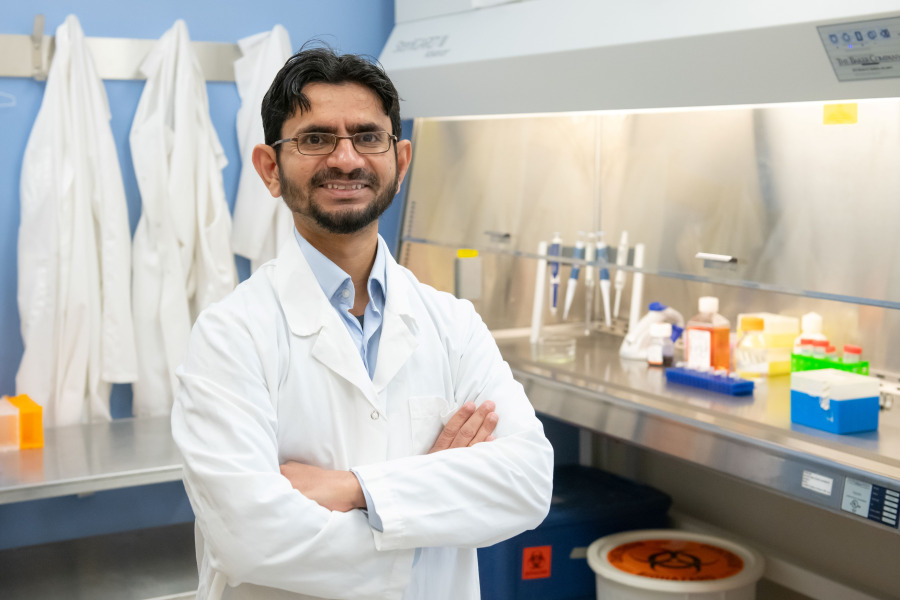UPEI PhD candidate awarded funding for innovative breast cancer research

Adnan Bhayo, a PhD candidate in Molecular and Macromolecular Sciences at the University of Prince Edward Island, is conducting breast cancer research with support from the Beatrice Hunter Cancer Research Institute (BHCRI).
As a trainee in the BHCRI’s Cancer Research Training Program, he has received $17,850 in funding from GIVETOLIVE, a charitable organization that “seeks to inspire people to live happy and healthy lives through generosity, fitness, and achievement of the extraordinary.” He is part of a research group led by Dr. Marya Ahmed, associate professor of chemistry at UPEI, winner of a Canadian Cancer Society Emerging Scholar Award, and BHCRI assistant scientific director for PEI.
“Breast cancer is one of the most common cancers among women, with one in eight women expected to be diagnosed at some point in their lifetime,” Bhayo said. “While chemotherapy remains the most common treatment, it has its limitations. Chemotherapy fails to fully eliminate cancer cells, allowing the disease to return, spread to other parts of the body, or even become less effective over time. Another major challenge in cancer treatment is the cancer’s ability to create an environment that suppresses the body’s immune system, thereby, reducing the activity of immune cells such as T-cells, dendritic cells, natural killer cells, and macrophages. This allows cancer cells to evade detection and grow uncontrollably.”
Macrophages are key cells in the immune system that can either promote or suppress the growth of cancer, depending on their type, he said. M2 macrophages typically promote the progression of cancer by suppressing the immune system—an anti-inflammatory response. In contrast, M1 macrophages boost the immune system’s ability to recognize and eliminate cancer cells—a pro-inflammatory response. Therefore, converting M2 macrophages into the M1 state could be an effective approach to treat cancer.
Bhayo’s research focuses on the use of host defence peptide (HDP), which converts macrophages from an M2 state to an M1 state, helping to overcome cancer-induced immune suppression and enhancing the immune system’s ability to target and eliminate cancer cells. To target diseased tissue more effectively, he modifies the peptide by attaching folic acid and mannose receptor molecules. This directs the treatment specifically to the tumor site, minimizing the risk of side effects and protecting healthy tissues. Early results from his research indicate that combining HDP peptide with the anticancer drug doxorubicin leads to more effective killing of cancer cells compared to using the anticancer drug alone.
“This approach holds significant potential for improving the effectiveness of cancer treatment,” he said.
Bhayo knows from personal experience the physical, emotional, and mental toll that cancer takes on patients and their loved ones.
‘‘Cancer has had a deep impact on my life in ways I can’t fully express,” he said. “In 2022, I lost my elder brother to cancer at the age of 41, and the pain of that loss still feels unbearable. I am driven by the hope that through this novel research, we can improve cancer treatments and help prevent others from experiencing the same tragedy my family and I have faced.”
Bhayo did his master’s degree in analytical chemistry at the University of Karachi, Pakistan. Before joining Dr. Ahmed’s group, he worked as a research assistant for a year at McMaster University in Ontario. He has published 15 research articles in peer-reviewed international journals.
About GIVETOLIVE:
GIVETOLIVE has been supporting BHCRI since 2017 through their BIG RIDE. The BIG RIDE challenges participants to get out of their comfort zone and cycle a long distance over multiple days, all while having fun and raising funds to support cancer research. GIVETOLIVE’s mission is to inspire people to live happy and healthy lives through generosity, fitness, and achievement of the extraordinary.
About the Beatrice Hunter Cancer Research Institute:
Created in 2009 through a bequest to the Dalhousie Medical Research Foundation, the Beatrice Hunter Cancer Research Institute exists to foster a collaborative, productive, and capacity-building cancer research effort in Atlantic Canada. The Beatrice Hunter Cancer Research Institute brings together a diverse community of cancer researchers in pursuit of a common goal: to save lives and ease the burden of cancer on individuals, families, and society. The Beatrice Hunter Cancer Research Institute provides a meeting place for researchers to share ideas and forge new collaborations and offers a key entry point for students seeking training and careers in cancer research. Contact: Dr. Jeanette Boudreau, Scientific Director (director@bhcri.ca)
UPEI acknowledges the assistance of Canada’s tri-council of federal granting agencies—Natural Sciences and Engineering Research Council of Canada (NSERC), the Social Sciences and Humanities Research Council (SSHRC), and the Canadian Institutes of Health Research (CIHR)—through its Research Support Fund, which helps fund services and infrastructure that support research activities at the University. In 2024–2025, UPEI’s RSF allocation is $1,041,691.